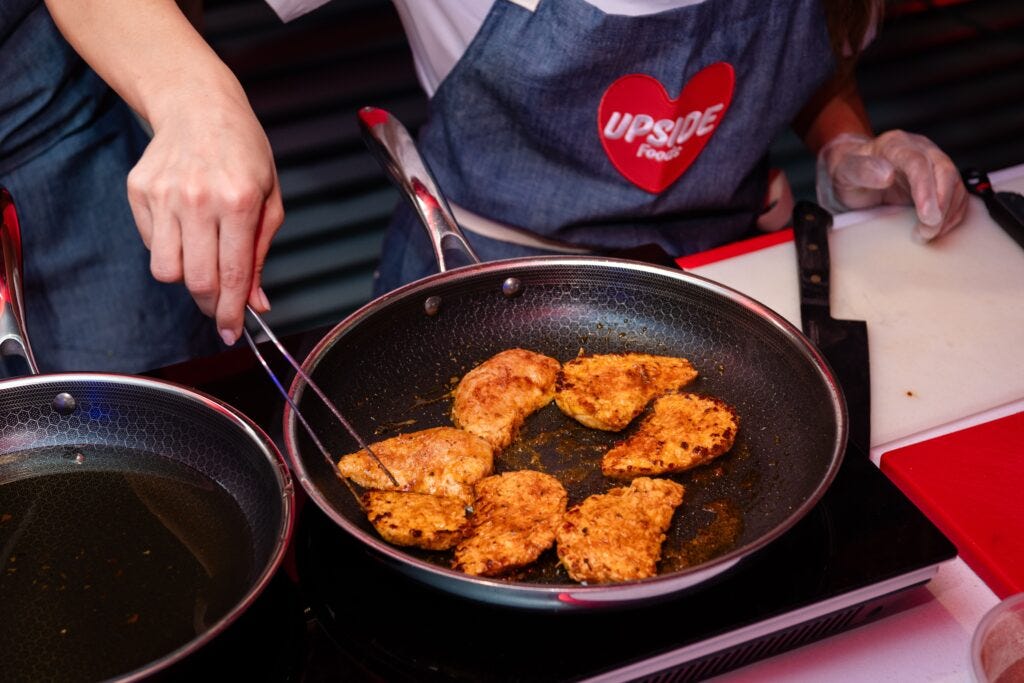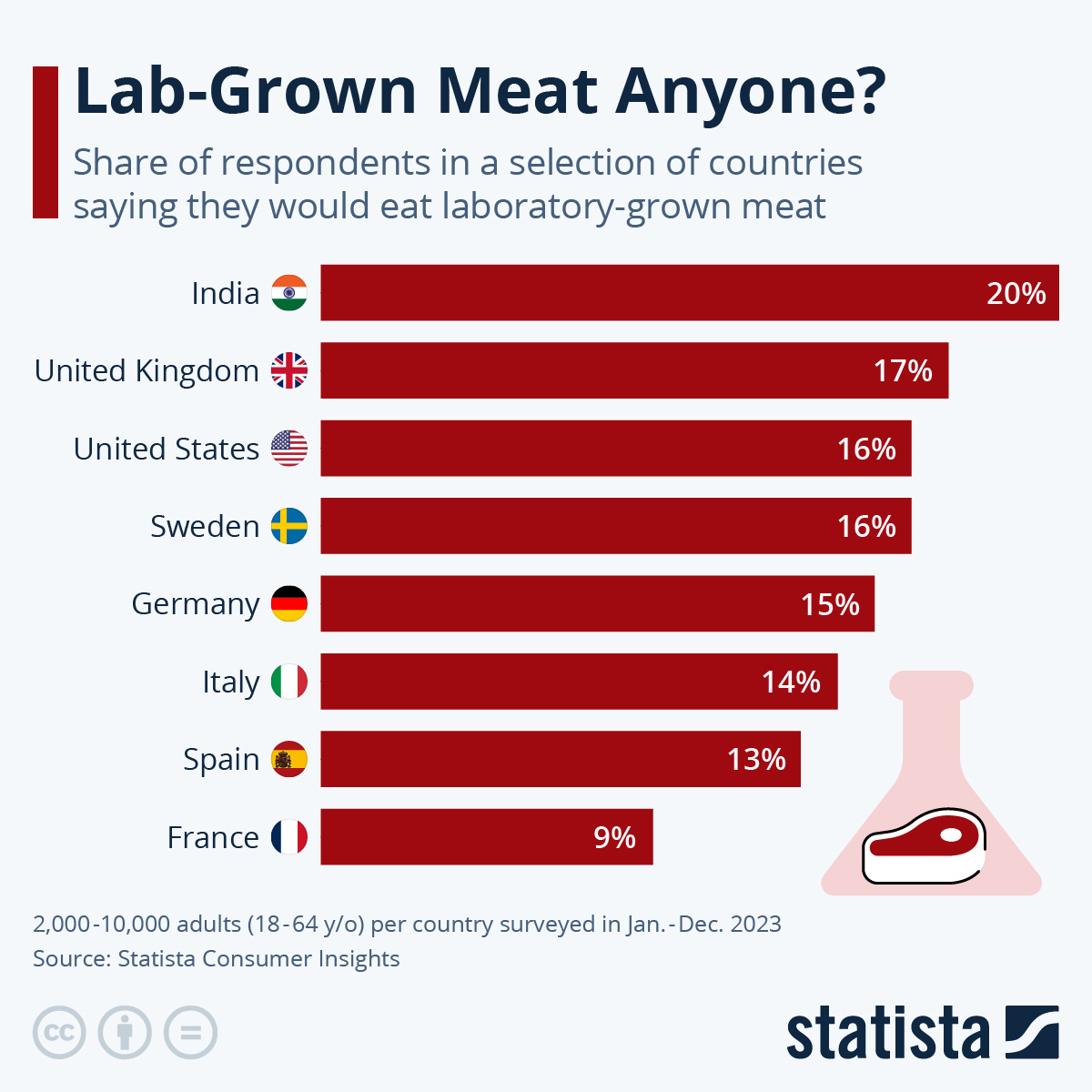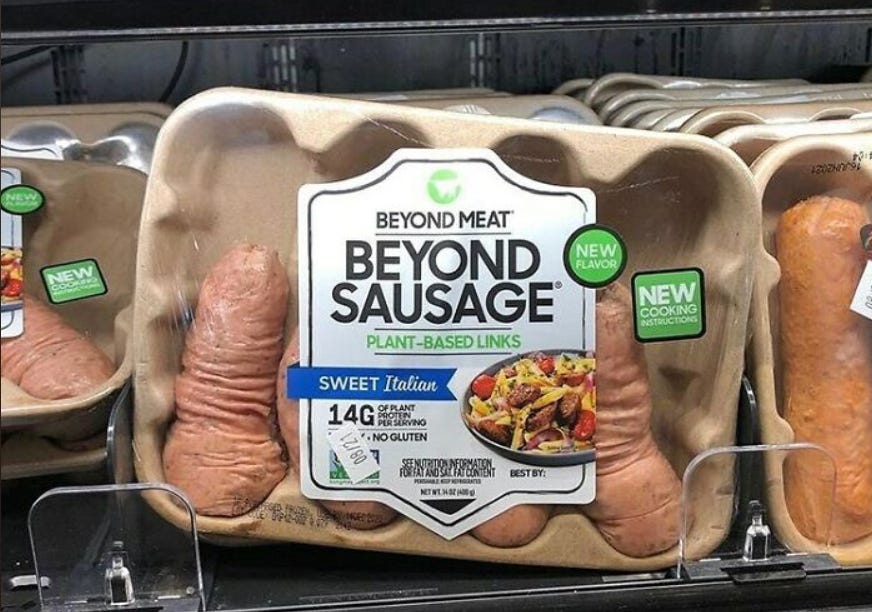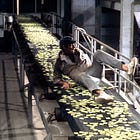Lab-grown meat is frankenfood's new battleground
Bill Gates has a stake in this. Need we say more?
In the 1973 sci-fi hit, Soylent Green, people will do anything to get their hands on the bland, green wafers that make up their main form of sustenance. Because of overpopulation and environmental degradation, there isn’t enough food to sustain the hordes. Only the wealthy and privileged have access to what we recognize as real food.
The movie has a few scenes that glorify the simple act of eating a meal. Here’s how the late, great chef Anthony Bourdain describes a scene where Charlton Heston confiscates fresh beef and vegetables from a murder scene he is investigating and brings it home to his friend and apartment mate, played by Edward G. Robinson:
Nothing here is taken for granted. There's an absolute appreciation for how wonderful plain, basic food can be. The crunch of a good apple, the crispness of a stick of celery, the delicacy of a plain old steak. No frills. No pretension. This same scene also shows how the shared experience of a great meal can really bring people together. The two characters barely say a word to each other, but their bond is strengthened by this fantastic meal they're sharing.
There are few things more fundamental to the human experience than sitting down to a shared meal. Still, we live in increasingly technocratic times, where society is significantly influenced and managed by ‘rational’ policy directed by science and technology. Nothing is sacred — including the food we sit down to eat.
Last week, we wrote about the latest trend in frankenfood production, molecular farming, which genetically engineers plants to produce animal proteins. Another frightening aspect of the techno-food revolution is lab-grown meat, touted as a way to address the supposed ethical and environmental concerns of raising livestock. Lab-grown meat is developed through a scientific process that involves cultivating animal cells in a controlled, sterile environment.
“We feed the cells the same thing you and I would eat except in a much more simplified form,” Eric Schulze, vice-president of product and regulation at UPSIDE foods, a lab-grown meat manufacturer, explained in a video recently.
So if we're eating, say, meat or protein or starches in, like, a potato, we just break those down to its components: amino acids in the case of protein, sugars in the case of starches, vitamins, minerals, those sorts of things. You take cells which are living, and as long as they're fed, kept warm, and given a place to grow without competition from bacteria, they'll continue to grow using their genetic programming — and they will produce the same thing that's in an animal. And then you can eat it.
The argument for lab-grown meat goes something like this:
‘Concentrated animal agriculture ruins the environment. There are more people on earth than ever and, as such, the demand for meat is expected to skyrocket. Meeting that demand through conventional animal agriculture will have catastrophic consequences.’
But what they don’t tell you is producing lab-grown meat requires significant energy inputs, particularly to be able to maintain the sterile conditions necessary to grow cells successfully. Real animals have an immune system designed to stave off infections. Petri dishes do not. The high energy consumption required to keep things sterile can potentially offset any environmental benefits that lab-grown meat is supposed to deliver.
Despite the propaganda against it, farm-raised meat can be very environmentally friendly, especially when produced through sustainable practices. Regenerative agriculture approaches like rotational grazing and integrating livestock with crop production can enhance soil health, sequester carbon, and promote biodiversity. So, when proponents compare the carbon footprint of lab-grown meat to Concentrated Animal Feeding Operations (CAFOs) all the while ignoring resilient agricultural practices of small-scale farming, they make a specious argument. Don’t take it from us, ask the French — they know food.
Plus, the nutritional profile of pastured-raised meat is what the human body has evolved to digest and convert to energy. This is next to impossible to replicate in a lab. Animals raised on farms have varied diets that contribute to rich and complex flavor profiles. The natural diet of an animal, which often includes grass, grains, and other organic matter, results in meat that is not only nutritionally rich in vitamins, minerals, and essential fatty acids but also delicious. No amount of tinkering in a lab will give you the intricate marbling and texture of meat that comes from an animal’s natural growth processes and free movement in a pasture.
UPSIDE Foods, backed by heavyweight investors like the Abu Dhabi Growth Fund, Richard Branson, and (surprise, surprise) Bill Gates, was the first company to introduce a ‘cultivated’ meat product to the US market. For whatever it’s worth, it received ‘regulatory clearances’ from the FDA in 2022 and the USDA in 2023. Schulze, the VP quoted above whose role at UPSIDE encompasses steering those regulatory approval processes, previously worked at the FDA on regulating novel biotechnologies for both food and drugs.
See where this is headed?

UPSIDE just recently threw a Food Freedom beach party in Miami, touted as a way for Floridians to get their first and last chance to taste cultivated meat before it's banned in the state. That’s because Governor Ron DeSantis just signed a bill, which took effect July 1, banning the sale of lab-grown meat in the state. The legislation aims to protect the state's agriculture industry and addresses concerns about the unknown long-term effects of consuming lab-grown meat.
"We believe that cultivated meat is an essential part of the future of food, and that people should have the right to choose what goes on their plates," says Dr. Uma Valeti, UPSIDE’s CEO and founder. "This law disregards food safety experts, limits consumer choice, and stifles American innovation.”
Several other states have taken steps to ban lab-grown meat, citing various concerns ranging from consumer safety to the protection of traditional farming industries. Alabama and Iowa, like Florida, have already enacted restrictions. Alabama’s law takes effect in October 2024 and prohibits the manufacture, sale, or distribution of food products made from cultured animal cells. Iowa's legislation specifically targets educational institutions, prohibiting schools from purchasing lab-grown meat, and emphasizing the state's commitment to traditional meat products and support to local farmers.
Arizona and Tennessee have considered similar bans, although not all proposals have been enacted into law yet. And globally, countries like Italy have also banned lab-grown meat, further reflecting the widespread skepticism and regulatory challenges faced by this emerging industry.
While the following aren’t lab grown — these are actually ‘plant based’ sausages — they still stand as the perfect metaphor for what frankenfood can do for you.
THE ROGUE FOOD CONFERENCE IS COMING TO TEXAS!
If you love food the way we at Collapse Life love food, then join us at the upcoming Rogue Food Conference in Dallas, Texas on November 8-9. We’re not sponsors, we’re just big, big fans of what John Moody and Joel Salatin stand for. In the face of everything we’ve been fighting, wouldn’t it be great to learn the lost art of butchery? Or how to rebuild local farms and food systems? Get your tickets here and be part of reshaping America’s plate. See you there!








I will never eat lab grown. Thank you for bringing more awareness to this very important issue. It's beyond my understanding that people think healthy meat can be grown in a lab, in sterile conditions, and be beneficial to a humans complex microbial, digestive, immune and neurological systems needs. It's garbage.
Excellent, love the image ..it does say it all. You are more fortunate in the US with states banning it, that will not happen in the UK .